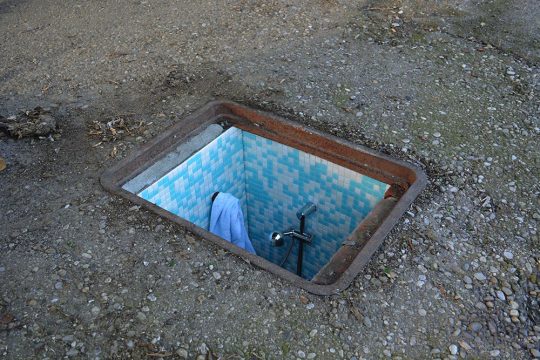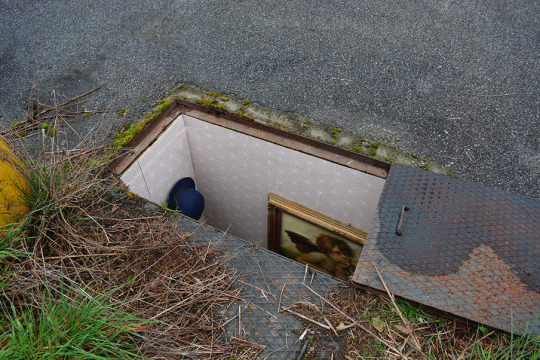30 April 2016
i Kantian ethics
Libellés :
Immanuel Kant,
Mary Anne Hobbs,
Nosaj Thing
29 April 2016
cantec despre haine si alte chestii
the human condition of plurality
hai sa fim impreuna
initium ut esset homo creatus est
el m-a intrebat
si eu am spus "da"
si acuma - gata
tre sa merg pana la capat
semestrul viitor va fi promitator
important - fara panica
there's always more
si eu am spus "da"
si acuma - gata
tre sa merg pana la capat
semestrul viitor va fi promitator
important - fara panica
there's always more
Libellés :
Massive Attack,
Theory group
28 April 2016
libido etc.
Libellés :
Bernard Stiegler,
Jacques Derrida
iuhu
un pas mic pentru omenire
un pas mare pentru mau
un pas mare pentru mau
ale tale mauri toate numai eu stiu sa le-ascult
27 April 2016
masina timpului
cand dai play la cantece vechi
si in cap vin oameni
si locuri
si stari
in metrou dimineata la 6 in drum spre primarie
:)
ce tripant
15 ani in urma
s-a schimbat totul si nu s-a schimbat nimic
parca tre de crescut
si parca nu
nu ma mai joc cu fiece cantec
am pus tot albumul si-am inceput sa plang
si in cap vin oameni
si locuri
si stari
in metrou dimineata la 6 in drum spre primarie
:)
ce tripant
15 ani in urma
s-a schimbat totul si nu s-a schimbat nimic
parca tre de crescut
si parca nu
nu ma mai joc cu fiece cantec
am pus tot albumul si-am inceput sa plang
dedicatie muzicala pentru frumos si sfant
cand umblam pe strazi
prin farmacii
prin multime
pe langa mare
pe la soare
in graba
in trip
cand s-a pavat drumul
prin farmacii
prin multime
pe langa mare
pe la soare
in graba
in trip
cand s-a pavat drumul
pup
deschide chrome-ul
intra in wiki
cauta "dialectic"
enjoy
intra in wiki
cauta "dialectic"
enjoy
26 April 2016
Tornado Warning and jazz
gata-fata-ikebana
liga masonilor de primavara prezinta:
variatii pe tema "inflorire si mister"
conferinta interurbana a printeselor
conferinta interurbana a printeselor
25 April 2016
les gars du XXIe siècle
dinamica universului
24 April 2016
23 April 2016
n-am valium si n-am numarul tau de telefon
j'aime bien
21 April 2016
n-am aer
hahaha!
3 minute jumate de popsa extrem de trista si hop! un sample de la DCD
si totul a devenit roz
si respect
si dragoste
si miau
piesa asta-i pentru arhiva
n-are statut de opera de arta
e, dupa mine, unul din cele mai proaste chestii factute de Fila
si totul a devenit roz
si respect
si dragoste
si miau
piesa asta-i pentru arhiva
n-are statut de opera de arta
e, dupa mine, unul din cele mai proaste chestii factute de Fila
Libellés :
Dead Can Dance,
Fila Brazillia
20 April 2016
La réintroduction d'une mentalité mystique
go back
way back
way back
420
noi doi ne potrivim
ca mana si manusa
ca perna si amiaza
ca painea si untul
ca apa si cafeaua
ca foaia si pixul
sau cartonul
sau indoitul
sarbatoarea continua
19 April 2016
keyword: dominate
The opposition between the tastes of nature and the tastes of freedom introduces a relationship which is that of the body to the soul, between those who are 'only natural' and those whose capacity to dominate their own biological nature affirms their legitimate claim to dominate social nature.
18 April 2016
16 April 2016
synkronizare
formalistii rusi numesc asta "сюжет"
eu numesc asta "eu am rupt"
15 April 2016
endgame
il ador pe David Thewlis
noapte buna :)
Libellés :
David Thewlis,
Endgame,
Samuel Beckett
acel moment
in care Bourdie iti demonstreaza ca esti Working class
citesti si intelegi ca gusturile tale sunt dictate de treapta pe care esti pe scara sociala
atat de tare iubesc Blue Danube
si-mi pare tat de minunat
si cand colo vine Bourdieu si-mi zice ca-i ceva de working si middle-class si ca, de fapt, ca sa fiu elevata si cultivata tre sa-mi placa cel putin The Well-Tempered Clavier
dar, si mai mult, Concerto for left Hand
acuma cum sa traiesc mai departe?
citesc si astept sa cresc
PS. un link la cateva cursuri gratuite de la The Great Courses
PS. un link la cateva cursuri gratuite de la The Great Courses
Libellés :
Johann Sebastian Bach,
Johann Strauss,
Maurice Ravel,
Pierre Bourdieu
M is for Merde
"fantana" lui Duchamp a fost conceputa in 1917
in 1961 Piero Manzoni a facut lucrurile mai serioase
ieri ma uitam la un interviu cu Onfray (nu mai stiam daca fac bine sau ba ca-l privesc atat de mult; sunt infectata uneori de ideile lui dar gasesc in el o sursa imensa de informatie condensata, gata de a fi absorbita, si asta-i tare comod si interesant) si el a propus, argumentand sfarsiturile civilizatiei europene, o listura de artisti care au promovat nihilismul si au demonstrat ca nu mai putem produce nimic si ca suntem cam pe moarte
voici nihi-lista:
- monocromul (Kazimir Malevich - 1915; Yves Klein - 1961)
- letrismul (Isidore Isou - 1945)
- muzica fara sunet (John Cage - 1952)
- cinematografia fara imagini (Gyu Debord - 1952)
- noul roman: lipsa personajului, intrigii, psihologiei in roman (Alain Robbe-Grillet - 1963)
ma intrebam de ce n-a vorbit de Duchamp si de Manzoni ca o varianta si mai pronuntata a nihilismului, ca un Merdism
acestea fiind spuse, am primit bursa pentru a merge la conferinta deci iuhu si merde mie!
simpatica ziua de azi
Libellés :
Alain Robbe-Grillet,
Gyu Debord,
Isidore Isou,
John Cage,
Kazimir Malevich,
Marcel Duchamp,
Michel Onfray,
Piero Manzoni,
Yves Klein
Do not go gentle into that good night
Otto Rank a fost psihanalistul si iubitul lui Anaïs Nin
in aceeasi ordine de idei "Henry & June" (1990)
complicata povestea vietii ei
mai ales sa ai doua casnicii simultate si sa le ascunzi timp de 11 ani, madness
"I tell so many lies I have to write them down and keep them in the lie box so I can keep them straight." Anaïs Nin
in aceeasi ordine de idei "Henry & June" (1990)
complicata povestea vietii ei
mai ales sa ai doua casnicii simultate si sa le ascunzi timp de 11 ani, madness
"I tell so many lies I have to write them down and keep them in the lie box so I can keep them straight." Anaïs Nin
Libellés :
Anaïs Nin,
Dylan Thomas,
Otto Rank
14 April 2016
Breathing pieces of defecating meat
Becker's philosophy as it emerges in Denial of Death and Escape from Evil is a braid woven from four strands.
The first strand. The world is terrifying. To say the least, Becker's account of nature has little in common with Walt Disney. Mother Nature is a brutal bitch, red in tooth and claw, who destroys what she creates. We live, he says, in a creation in which the routine activity for organisms is "tearing others apart with teeth of all types — biting, grinding flesh, plant stalks, bones between molars, pushing the pulp greedily down the gullet with delight, incorporating its essence into one's own organization, and then excreting with foul stench and gasses the residue."
The second strand. The basic motivation for human behavior is our biological need to control our basic anxiety, to deny the terror of death. Human beings are naturally anxious because we are ultimately helpless and abandoned in a world where we are fated to die. "This is the terror: to have emerged from nothing, to have a name, consciousness of self, deep inner feelings, an excruciating inner yearning for life and self-expression — and with all this yet to die."
Elizabeth Kubler-Ross and Ernest Becker were strange allies in fomenting the cultural revolution that brought death and dying out of the closet. At the same time that Kubler-Ross gave us permission to practice the art of dying gracefully, Becker taught us that awe, fear, and ontological anxiety were natural accompaniments to our contemplation of the fact of death.
The third strand. Since the terror of death is so overwhelming we conspire to keep it unconscious. "The vital lie of character" is the first line of defense that protects us from the painful awareness of our helplessness. Every child borrows power from adults and creates a personality by introjecting the qualities of the godlike being. If I am like my all-powerful father I will not die. So long as we stay obediently within the defense mechanisms of our personality, what Wilhelm Reich called "character armor" we feel safe and are able to pretend that the world is manageable. But the price we pay is high. We repress our bodies to purchase a soul that time cannot destroy; we sacrifice pleasure to buy immortality; we encapsulate ourselves to avoid death. And life escapes us while we huddle within the defended fortress of character.
Society provides the second line of defense against our natural impotence by creating a hero system that allows us to believe that we transcend death by participating in something of lasting worth. We achieve ersatz immortality by sacrificing ourselves to conquer an empire, to build a temple, to write a book, to establish a family, to accumulate a fortune, to further progress and prosperity, to create an information-society and global free market. Since the main task of human life is to become heroic and transcend death, every culture must provide its members with an intricate symbolic system that is covertly religious. This means that ideological conflicts between cultures are essentially battles between immortality projects, holy wars.
One of Becker's lasting contributions to social psychology has been to help us understand that corporations and nations may be driven by unconscious motives that have little to do with their stated goals. Making a killing in business or on the battlefield frequently has less to do with economic need or political reality than with the need for assuring ourselves that we have achieved something of lasting worth. Consider, for instance, the recent war in Vietnam in which the United States was driven not by any realistic economic or political interest but by the overwhelming need to defeat "atheistic communism."
The fourth strand. Our heroic projects that are aimed at destroying evil have the paradoxical effect of bringing more evil into the world. Human conflicts are life and death struggles — my gods against your gods, my immortality project against your immortality project. The root of humanly caused evil is not man's animal nature, not territorial aggression, or innate selfishness, but our need to gain self-esteem, deny our mortality, and achieve a heroic self-image. Our desire for the best is the cause of the worst. We want to clean up the world, make it perfect, keep it safe for democracy or communism, purify it of the enemies of god, eliminate evil, establish an alabaster city undimmed by human tears, or a thousand year Reich.
13 April 2016
Спасение (Иван Вырыпаев, 2015)
n-am vazut decat 20 de minute da-i interesant
o calugarita poloneza in Tibet
ma gandesc iar la religii
si la necesitatea lor pentru sufletul uman
e ceva intrinsec omului, nu?
sa iubeasca, sa spere si sa cada
update: minutul 40 si s-a inceput marele boredom
nu stiu ce sa zic...
cred ca nu merita :|
~~~
reupday: dupa 15 minute de chin, iar a devenit bun
era un rol prost jucat
~~~
m-am gandit la asta
PS. tot Вырыпаев a scris Кислород, din care a facut film in 2009
buna piesa si bun filmulet
...и каждая женщина поглощает кислород, но не каждая женщина сама является кислородом.
Libellés :
2009,
2015,
Иван Вырыпаев,
Кислород,
Спасение
11 April 2016
arcencielophile
un fel de Portishead
doar ca-i mai pe curcubeu
tare bine se preteaza vizualizarii
i can feel you when you breath
xxl
doar ca-i mai pe curcubeu
tare bine se preteaza vizualizarii
i can feel you when you breath
xxl
infinite difference is finite
A similar thing happens when we say as regards the sentence 'this rose is red': The grammatical predicate 'is red' belongs to the subject 'this rose'. Here the words 'The grammatical predicate "is red"' are not a grammatical predicate but a subject. By the very act of explicitly calling it a predicate, we deprive it of this property.
Libellés :
Frege,
Jacques Derrida,
Zero 7
10 April 2016
diegetic music
acel moment
intre vin
stiinta
Tarkovsky
Bresson
Diderot
Rousseau
Bohren and der Club of Gore
si iar vin
se invarte capul
de placere
acel moment
cand viata
a reusit
multumesc
ai facut bine
ce-ai
facut
intre vin
stiinta
Tarkovsky
Bresson
Diderot
Rousseau
Bohren and der Club of Gore
si iar vin
se invarte capul
de placere
acel moment
cand viata
a reusit
multumesc
ai facut bine
ce-ai
facut
08 April 2016
07 April 2016
dwell
вы мне больше не ты
si de-i bagat un UNKLE remix, mmm
Libellés :
Alexus Rose,
Ricky Blaze
Archimedean point
Libellés :
Hannah Arendt,
Radiohead
06 April 2016
Дазайн дазайнский
Libellés :
Martin Heidegger,
Willie Lindo
imoral de bun
Libellés :
Massive Attack,
Roots Manuva
elogiu solitudinii - it's a must
elogiu dragostei - ea are fata
Libellés :
eddie Vedder,
Massive Attack,
Nusrat Fateh Ali Khan
05 April 2016
ue
sezonul calatoriilor este oficial pe cale de a fi deschis
inca putin (c)
inca putin (c)
what is love, baby don't hurt me
even my conditioning has been conditioned
04 April 2016
sick!
Libellés :
EA Poe,
hip-hop,
MC Lars,
William Shakespeare
4891
part
full
full
Libellés :
1981,
1984,
full movie,
George Orwell,
Louis Malle,
My Dinner with Andre
in sfarsit un film tripant
There are 7 billion people on the planet.
You might be lucky enough to bump into the one person you want to spend the rest of your life with.
You might be lucky enough to bump into the one person you want to spend the rest of your life with.
tare vreau sa-l vad :)
sprawa
Max, ei nu scot album nou?
03 April 2016
give me shelter, show me heart
23 Emotions people feel, but can’t explain
Sonder: The realization that each passerby has a life as vivid and complex as your own.
Opia: The ambiguous intensity of Looking someone in the eye, which can feel simultaneously invasive and vulnerable.
Monachopsis: The subtle but persistent feeling of being out of place.
Énouement: The bittersweetness of having arrived in the future, seeing how things turn out, but not being able to tell your past self.
Vellichor: The strange wistfulness of used bookshops.
Rubatosis: The unsettling awareness of your own heartbeat.
Kenopsia: The eerie, forlorn atmosphere of a place that is usually bustling with people but is now abandoned and quiet.
Mauerbauertraurigkeit: The inexplicable urge to push people away, even close friends who you really like.
Jouska: A hypothetical conversation that you compulsively play out in your head.
Chrysalism: The amniotic tranquility of being indoors during a thunderstorm.
Vemödalen: The frustration of photographic something amazing when thousands of identical photos already exist.
Anecdoche: A conversation in which everyone is talking, but nobody is listening
Ellipsism: A sadness that you’ll never be able to know how history will turn out.
Kuebiko: A state of exhaustion inspired by acts of senseless violence.
Lachesism: The desire to be struck by disaster – to survive a plane crash, or to lose everything in a fire.
Exulansis: The tendency to give up trying to talk about an experience because people are unable to relate to it.
Adronitis: Frustration with how long it takes to get to know someone.
Rückkehrunruhe: The feeling of returning home after an immersive trip only to find it fading rapidly from your awareness.
Nodus Tollens: The realization that the plot of your life doesn’t make sense to you anymore.
Onism: The frustration of being stuck in just one body, that inhabits only one place at a time.
Liberosis: The desire to care less about things.
Altschmerz: Weariness with the same old issues that you’ve always had – the same boring flaws and anxieties that you’ve been gnawing on for years.
Occhiolism: The awareness of the smallness of your perspective.
02 April 2016
poveste despre internet
cand mergi prin internet si intalnesti fantomele
oamenilor pe care i-ai cunoscut
si i-ai iubit
si acuma-s loc
gol,
placut, poate
dar gol
ce tripant
unele fantome sunt ingeri
mereu pe langa tine
invizibili
protectori
altii sunt mici demoni care vor sa te readuca in trecut
si-si fac loc in tine
si incepe sa te roada
ce amestec nociv
nostalgie si complacere
stinge internetul
mergi prin casa
aici arde lumina
si canta muzica
oamenilor pe care i-ai cunoscut
si i-ai iubit
si acuma-s loc
gol,
placut, poate
dar gol
ce tripant
unele fantome sunt ingeri
mereu pe langa tine
invizibili
protectori
altii sunt mici demoni care vor sa te readuca in trecut
si-si fac loc in tine
si incepe sa te roada
ce amestec nociv
nostalgie si complacere
stinge internetul
mergi prin casa
aici arde lumina
si canta muzica
Libellés :
Mark Pritchard,
Thom Yorke
Verlaine gisant
oh my Rimbaud
tre de facut rost de album
se mai face muzica buna in lumea asta
ue
tre de facut rost de album
se mai face muzica buna in lumea asta
ue
Libellés :
John Greaves,
Verlaine gisant
și mă culși!?
time is money
am facut o amiaza de 2 ore si acuma intarzii cu scrisul
cum de trait mai departe in asa conditii?
criza!!!!
am facut o amiaza de 2 ore si acuma intarzii cu scrisul
cum de trait mai departe in asa conditii?
criza!!!!
Пикник на обочине
Счастье для всех, даром, и пусть никто не уйдет обиженным!
Libellés :
Stalker,
Братья Стругацкие,
Пикник на обочине
01 April 2016
lyre
The first act of the Trickster Hermes - using the shell of a tortoise “accidentally” stumbled over at the threshold of his cave - is to create the world’s first lyre. At the mouth of the cave, where the innerworld and the outerworld meet, there, in the synesthesia of liminality - at the spatiotemporal limit - the unforeseen present itself and the mythopoetic imagination was born.
Deardorff, Daniel. The Other Within: The Genius of Deformity in Myth, Culture and Psyche. Ashland, Or: White Cloud Press, 2004, p. 119
Libellés :
Alice Coltrane,
Daniel Deardorff,
lyre
Subscribe to:
Comments (Atom)












